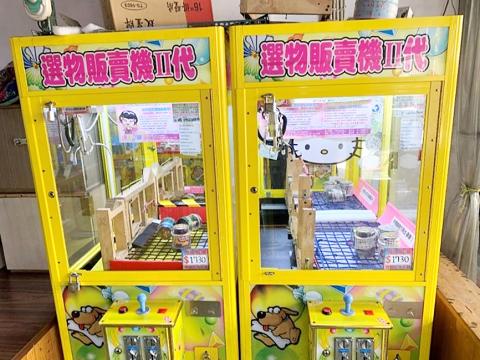An investigation by the Executive Yuan’s Consumer Protection Committee and the Consumers’ Foundation has found that about two out of every three claw machines in the six special municipalities are noncompliant, as they are either too close to schools or potentially contain illegal products.
An investigation of 143 claw machine stores in the six municipalities found that in Taipei, 30 percent were set up within 100m of a school, while the figure in New Taipei City was 24 percent, Taoyuan posted 28 percent, Taichung was 14 percent, Tainan had less than 10 percent and none were near schools in Kaohsiung, foundation president Lei Li-fen (雷立芬) said yesterday.
The foundation has long been concerned with claw machines and feels that they should target adults and not be considered arcade games, Lei said, adding that the presence of such stores around schools could affect students.

Photo courtesy of the Consumer Protection Committee
The foundation found electronic cigarettes, lingerie, sex toys and boxes containing Line accounts for women in claw machines, it said.
The legality of the products is questionable and certainly unsuitable for young people, Lei said.
Discoveries of food and drug products in machines last year could harm consumers on a wide scale, committee Director-General Liu Ching-fang (劉清芳) said.
There were more than 8,000 stores last year, with some providing up to 200 machines, Liu said.
Toys were still the largest genre of products in stores inspected this year, followed by electronics, stationery, clothing, food products and cosmetics, Liu said.
About 75 percent of stores were not up to standards or offered questionable products, Liu said.
The stores might have contravened at least seven laws, including the Protection of Children and Youths Welfare and Rights Act (兒童及少年福利與權益保障法), the Tobacco Hazards Prevention Act (菸害防制法), the Act Governing Food Safety and Sanitation (食品安全衛生管理法), the Statute for Prevention and Control of Infectious Animal Disease (動物傳染病防治條例), the Pharmaceutical Affairs Act (藥事法), the Electronic Game Arcade Business Regulation Act (電子遊戲場業管理條例) and gambling-related crimes under the Criminal Code, Liu said.
Store and machine owners were uncooperative, with 83 percent of machine owners absent during inspection and 37.5 percent of stores missing both store and machine owners, committee official Wang Chih-hung (王志宏) said.
The Ministry of Economic Affairs’ office in central Taiwan and the Food and Drug Administration are to oversee investigations by local governments’ departments of social welfare and health, Wang said.
Lei said claw machines should be under the ministry’s jurisdiction.
The Electronic Game Arcade Business Regulation Act should be the legal basis for managing the stores, with defined age restrictions and separated legal responsibilities for store owners and machine owners, Lei said, adding that stores should also be responsible for the merchandise in all machines.

Beijing could eventually see a full amphibious invasion of Taiwan as the only "prudent" way to bring about unification, the US Department of Defense said in a newly released annual report to Congress. The Pentagon's "Annual Report to Congress: Military and Security Developments Involving the People's Republic of China 2025," was in many ways similar to last year’s report but reorganized the analysis of the options China has to take over Taiwan. Generally, according to the report, Chinese leaders view the People's Liberation Army's (PLA) capabilities for a Taiwan campaign as improving, but they remain uncertain about its readiness to successfully seize

HORROR STORIES: One victim recounted not realizing they had been stabbed and seeing people bleeding, while another recalled breaking down in tears after fleeing A man on Friday died after he tried to fight the knife-wielding suspect who went on a stabbing spree near two of Taipei’s busiest metro stations, Taipei Mayor Chiang Wan-an (蔣萬安) said. The 57-year-old man, identified by his family name, Yu (余), encountered the suspect at Exit M7 of Taipei Main Station and immediately tried to stop him, but was fatally wounded and later died, Chiang said, calling the incident “heartbreaking.” Yu’s family would receive at least NT$5 million (US$158,584) in compensation through the Taipei Rapid Transit Corp’s (TRTC) insurance coverage, he said after convening an emergency security response meeting yesterday morning. National

Taiwan has overtaken South Korea this year in per capita income for the first time in 23 years, IMF data showed. Per capita income is a nation’s GDP divided by the total population, used to compare average wealth levels across countries. Taiwan also beat Japan this year on per capita income, after surpassing it for the first time last year, US magazine Newsweek reported yesterday. Across Asia, Taiwan ranked fourth for per capita income at US$37,827 this year due to sustained economic growth, the report said. In the top three spots were Singapore, Macau and Hong Kong, it said. South

PLANNED: The suspect visited the crime scene before the killings, seeking information on how to access the roof, and had extensively researched a 2014 stabbing incident The suspect in a stabbing attack that killed three people and injured 11 in Taipei on Friday had planned the assault and set fires at other locations earlier in the day, law enforcement officials said yesterday. National Police Agency (NPA) Director-General Chang Jung-hsin (張榮興) said the suspect, a 27-year-old man named Chang Wen (張文), began the attacks at 3:40pm, first setting off smoke bombs on a road, damaging cars and motorbikes. Earlier, Chang Wen set fire to a rental room where he was staying on Gongyuan Road in Zhongzheng District (中正), Chang Jung-hsin said. The suspect later threw smoke grenades near two exits